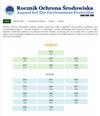Discrete-Pulsed Energy Input Based Method for Neutralisation of the Acidic Condensate
IF 0.4
4区 环境科学与生态学
Q4 ENVIRONMENTAL SCIENCES
引用次数: 0
Abstract
The article's authors analysed the most perspective and widely known methods of neutralising the acidic condensate, which is a by-product of natural gas combustion. Among them, the hydrodynamic cavitation method was the most effective. In this regard, it was proposed to improve this method by using the method of discrete-pulsed energy input, which involves neutralisation due to the degassing process. Based on the mathematical model of the bubble ensemble dynamics, a numerical simulation of the formation and growth of vapour-gas bubbles in the process of cavitation boiling of condensate was carried out. Also, an analytical study of the evolution of the vapour-gas bubble population and changes in the current vapour content of the condensate during its boiling was investigated under different values of the initial size of gas micronuclei. The results of the experimental study also confirmed the effectiveness of this method and showed that almost complete removal of carbonic acid from condensate occurs during the first two minutes of processing. That is evidenced by the increased pH values of condensate, which corresponds to the range of permissible pH values of distilled water. Therefore, the carbonic acid in the condensate is absent. Using this method will significantly reduce the environmental effect and the amount of harmful emissions.基于离散脉冲能量输入的酸性冷凝物中和方法
这篇文章的作者分析了最有前景和最广为人知的中和酸性凝析油的方法,这是天然气燃烧的副产品。其中,水动力空化法效果最好。在这方面,有人提出采用离散脉冲能量输入方法来改进该方法,该方法涉及由于脱气过程而产生的中和作用。基于气泡系综动力学的数学模型,对凝析液空化沸腾过程中汽-气气泡的形成和成长过程进行了数值模拟。同时,分析研究了在不同气体微核初始尺寸下,汽-气气泡数量的演变和冷凝物沸腾过程中当前蒸汽含量的变化。实验研究的结果也证实了该方法的有效性,并表明在处理的前两分钟内几乎可以完全去除冷凝水中的碳酸。冷凝液的pH值升高,与蒸馏水的允许pH值范围相对应,证明了这一点。因此,冷凝液中不存在碳酸。使用这种方法将大大减少对环境的影响和有害排放物的数量。
本文章由计算机程序翻译,如有差异,请以英文原文为准。
求助全文
约1分钟内获得全文
求助全文
来源期刊

Rocznik Ochrona Srodowiska
ENVIRONMENTAL SCIENCES-
CiteScore
1.10
自引率
0.00%
发文量
0
期刊介绍:
Rocznik Ochrona Srodowiska publishes articles concerning widely understood environmental engineering and environmental protection. We are interested in manuscripts covering technologies and equipment used in water treatment, wastewater treatment, air purification, thermal utilization, processing and use of waste. But we publish also papers concerning sanitary installations, environmental law, education and health protection in relation to the protection of the human environment.
 求助内容:
求助内容: 应助结果提醒方式:
应助结果提醒方式:


